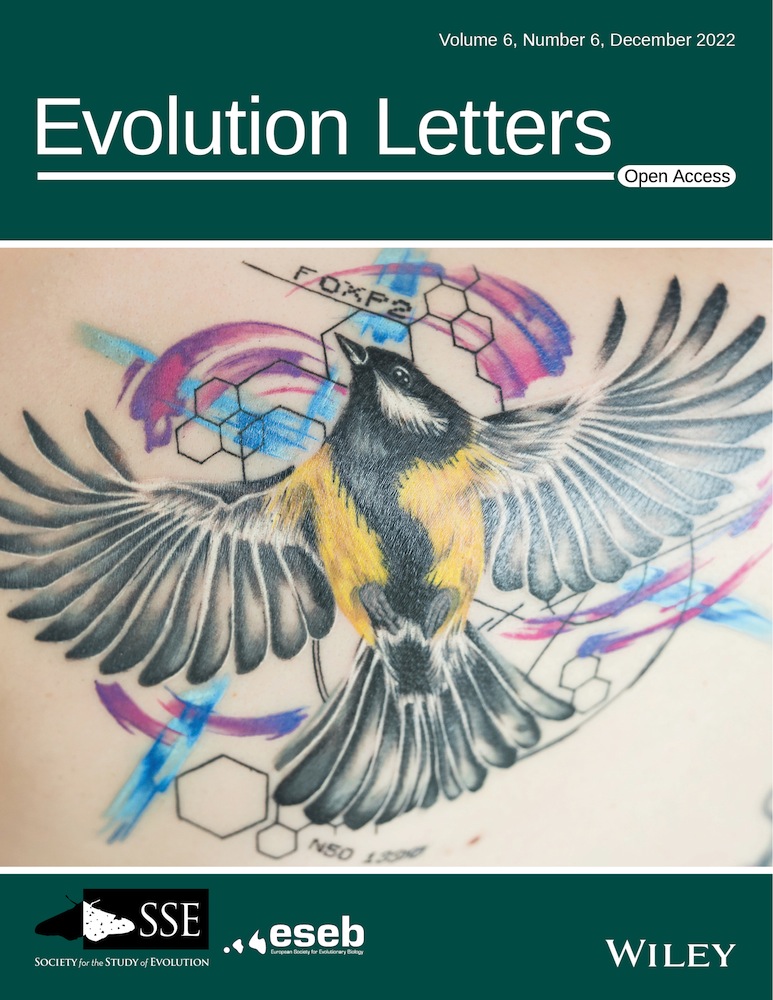The link between gene duplication and divergent patterns of gene expression across a complex life cycle
IF 3.4
1区 生物学
Q2 EVOLUTIONARY BIOLOGY
引用次数: 0
Abstract
The diversification of many lineages throughout natural history has frequently been associated with evolutionary changes in life cycle complexity. However, our understanding of the processes that facilitate differentiation in the morphologies and functions expressed by organisms throughout their life cycles is limited. Theory suggests that the expression of traits is decoupled across life stages, thus allowing for their evolutionary independence. Although trait decoupling between stages is well established, explanations of how said decoupling evolves have seldom been considered. Because the different phenotypes expressed by organisms throughout their life cycles are coded for by the same genome, trait decoupling must be mediated through divergence in gene expression between stages. Gene duplication has been identified as an important mechanism that enables divergence in gene function and expression between cells and tissues. Because stage transitions across life cycles require changes in tissue types and functions, we investigated the potential link between gene duplication and expression divergence between life stages. To explore this idea, we examined the temporal changes in gene expression across the monarch butterfly (Danaus plexippus) metamorphosis. We found that within homologous groups, more phylogenetically diverged genes exhibited more distinct temporal expression patterns. This relationship scaled such that more phylogenetically diverse homologous groups showed more diverse patterns of gene expression. Furthermore, we found that duplicate genes showed increased stage-specificity relative to singleton genes. Overall, our findings suggest an important link between gene duplication and the evolution of complex life cycles.基因复制与复杂生命周期中基因表达模式差异之间的联系
在整个自然历史中,许多生物系的多样化往往与生命周期复杂性的进化变化有关。然而,我们对促进生物体在整个生命周期中所表现的形态和功能分化的过程了解有限。理论认为,不同生命阶段的性状表达是脱钩的,因此它们在进化上是独立的。虽然不同阶段之间的性状脱钩已经得到证实,但人们很少考虑如何解释这种脱钩是如何演变的。由于生物在整个生命周期中表现出的不同表型是由相同的基因组编码的,因此性状脱钩必须通过不同阶段之间基因表达的差异来实现。基因复制被认为是细胞和组织间基因功能和表达差异的重要机制。由于生命周期的阶段转换需要组织类型和功能的变化,我们研究了基因复制与生命阶段间表达差异之间的潜在联系。为了探讨这一观点,我们研究了帝王斑蝶(Danaus plexippus)变态过程中基因表达的时间变化。我们发现,在同源群中,系统发育差异较大的基因表现出更明显的时间表达模式。这种关系的比例关系是,系统发育差异越大的同源组,其基因表达模式越多样化。此外,我们还发现,与单基因相比,重复基因表现出更强的阶段特异性。总之,我们的研究结果表明,基因复制与复杂生命周期的进化之间存在重要联系。
本文章由计算机程序翻译,如有差异,请以英文原文为准。
求助全文
约1分钟内获得全文
求助全文
来源期刊

Evolution Letters
EVOLUTIONARY BIOLOGY-
CiteScore
13.00
自引率
2.00%
发文量
35
审稿时长
10 weeks
期刊介绍:
Evolution Letters publishes cutting-edge new research in all areas of Evolutionary Biology.
Available exclusively online, and entirely open access, Evolution Letters consists of Letters - original pieces of research which form the bulk of papers - and Comments and Opinion - a forum for highlighting timely new research ideas for the evolutionary community.
 求助内容:
求助内容: 应助结果提醒方式:
应助结果提醒方式:


